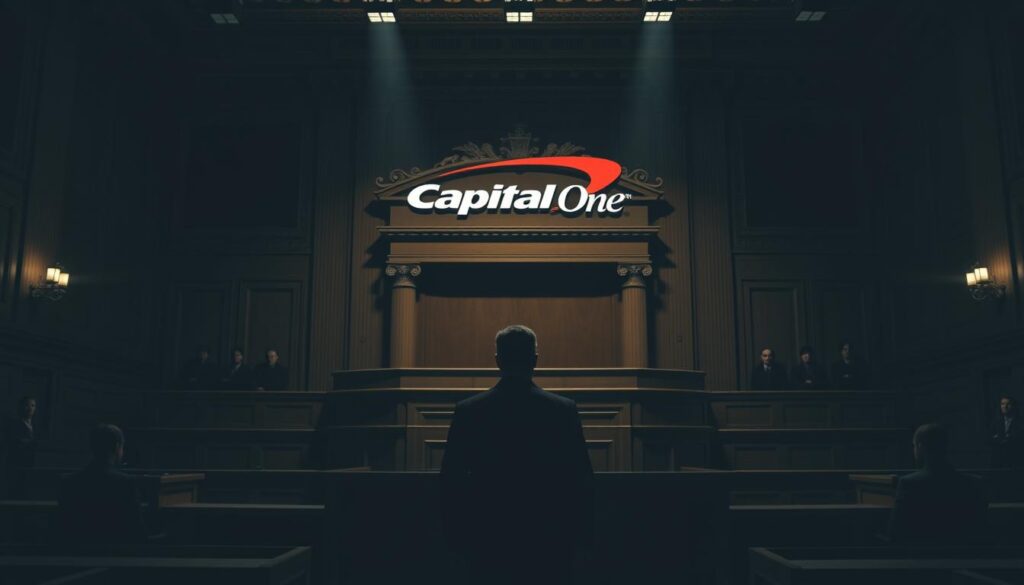Capital One Take You to Court for Credit Card Debt: Getting a lawsuit notice from a creditor can be really stressful. If you’re wondering if Capital One can sue you for credit card debt, you’re not alone.
Many people facing money troubles worry about what happens if they can’t pay their credit cards. It’s important to know your rights and options for dealing with debt.
If you’re dealing with credit card debt and might face a Capital One lawsuit, don’t worry. You have options. Understanding the process of credit card debt collection can help you make smart choices about your money.
Contents
- 1 Understanding Credit Card Debt Collection Practices
- 2 Does Capital One Sue for Credit Card Debt?
- 3 The Legal Process of a Credit Card Debt Lawsuit
- 4 Your Options When Facing a Capital One Lawsuit
- 5 Conclusion
- 6 FAQ: Can Capital One Take You to Court for Credit Card Debt?
- 6.1 Can I negotiate a settlement with Capital One if I’m facing a lawsuit?
- 6.2 What happens if I ignore a lawsuit notice from Capital One?
- 6.3 How long does Capital One have to sue me for credit card debt?
- 6.4 Can I contest a lawsuit from Capital One?
- 6.5 Will Capital One sue me for a small amount of credit card debt?
- 6.6 Can I settle my credit card debt with Capital One for less than I owe?
- 6.7 What are my options if I’m unable to pay a judgment from a Capital One lawsuit?
Understanding Credit Card Debt Collection Practices
If you’re dealing with credit card debt, knowing how creditors collect is key. Companies like Capital One use many ways to get back what’s owed. Knowing these can help you handle your debt better.
Credit card companies first try to reach out to you. They use phone calls, emails, and letters. If you don’t pay, they might tell credit bureaus, hurting your score. It’s important to know this to manage your debt well.
Debt collection steps are similar for most creditors. Here’s what usually happens:
- Initial Contact: The creditor will try to talk to you about your debt.
- Settlement Negotiations: They might suggest paying less than what you owe.
- Escalation: If talks fail, they might send your debt to a collections agency or sue you.
Knowing these steps helps you get ready and might prevent more trouble. Remember, creditors must follow laws like the Fair Debt Collection Practices Act (FDCPA). This law protects you from unfair practices.
| Collection Method | Description | Potential Impact |
|---|---|---|
| Phone Calls | Repeated calls to discuss debt | Stress, potential harassment |
| Email/Letters | Formal communication regarding debt | Notification of debt status |
| Credit Reporting | Reporting delinquency to credit bureaus | Negative credit score impact |
Understanding how creditors collect debt helps you deal with it better. It can also help you avoid serious problems like lawsuits.
Does Capital One Sue for Credit Card Debt?
Are you worried about Capital One suing you for credit card debt? Yes, they can, under certain conditions. Like other credit card companies, Capital One can take legal steps if you don’t pay your debt.
Capital One usually tries other ways to get you to pay before suing. They might sue if the debt is big and you’ve missed payments for a long time. [Can Capital One Take You to Court for Credit Card Debt?]

- The total amount owed: Larger debts are more likely to result in a lawsuit.
- The duration of delinquency: Accounts that have been delinquent for a longer period are more likely to be considered for legal action.
- Previous collection efforts: If Capital One has already attempted to collect the debt through various means without success, they may opt for legal action.
Before suing, you’ll get several notices from Capital One or their collectors. These notices will tell you your account is overdue and needs to be paid.
Knowing when Capital One might sue can help you handle your debt better. It might even help you avoid legal trouble. [Can Capital One Take You to Court for Credit Card Debt?]
See Also: Does Discover Sue for Credit Card Debt? Find Out Now
The Legal Process of a Credit Card Debt Lawsuit
If you’re facing a credit card debt lawsuit, knowing the legal steps can help. The process starts when a creditor, like Capital One, decides to sue you for unpaid debt. [Can Capital One Take You to Court for Credit Card Debt?]
The first step is filing a lawsuit. The creditor will file a complaint with the court. This is usually in the county where you live or where you signed the credit card agreement. The complaint will state how much you owe, the creditor’s claim, and the legal reasons for the lawsuit.
After the lawsuit is filed, you’ll get a lawsuit notice. This is usually from a process server or by certified mail. The notice will tell you about the lawsuit, the court, the case number, and when you need to respond.
It’s very important to respond to the lawsuit notice on time. You usually have 20 or 30 days, depending on your state’s laws. If you don’t respond, you could lose the case by default. This could lead to your wages being garnished or your bank account being levied.
When you respond to the lawsuit, you have a few options. You can:
- Admit or deny the creditor’s allegations.
- Use any defenses you have, like the statute of limitations or improper service.
- File a counterclaim if you think the creditor has broken the law.
The table below shows the main steps in a credit card debt lawsuit:
| Step | Description | Timeline |
|---|---|---|
| Lawsuit Filing | Creditor files a complaint with the court. | Variable |
| Lawsuit Notice | You are served with the lawsuit notice. | After lawsuit filing |
| Response | You respond to the lawsuit. | Within 20-30 days |
| Court Proceedings | The case goes to court hearings or trial. | After response |
Knowing the legal steps of a credit card debt lawsuit can help you make better choices. It’s wise to talk to a lawyer who specializes in debt collection defense. They can help you through this tough time.
Your Options When Facing a Capital One Lawsuit
Getting a lawsuit notice from Capital One can be scary. But, you have several paths to take. Understanding your options is key to making smart choices about your money. [Can Capital One Take You to Court for Credit Card Debt?]
One option is to try to settle with Capital One. This means agreeing to pay less than what you owe. Settling can help avoid more legal trouble. Make sure any deal is clear and you know what you’re agreeing to.
Another choice is to fight the lawsuit. This means questioning the lawsuit’s validity or the amount owed. Fighting can be tough and often needs a lawyer. You’ll need proof, like payment records, to back up your case.
Getting help from a professional is also a good idea. A debt settlement attorney or credit counselor can guide you. They can help with negotiations or look into other debt relief options. [Capital One Take You to Court for Credit Card Debt]
Understanding the Implications
It’s important to know what each option means. For example, settling might hurt your credit score. Fighting can take time and money. Getting expert advice can help you understand the risks better.
- Negotiating a settlement can stop the lawsuit but may affect your credit score.
- Contesting the lawsuit can result in a favorable judgment if you have a strong case.
- Seeking professional help can provide you with the expertise needed to navigate complex legal and financial issues.
The right choice depends on your financial situation and goals. By knowing your options and possibly getting advice, you can make a decision that works for you and your Capital One credit card debt.
Conclusion
Dealing with credit card debt can feel overwhelming. Especially when you might face a lawsuit from Capital One. It’s important to know your options for managing this debt.
You can look into different ways to resolve your debt. This includes negotiating a settlement or getting help from a credit counseling agency. Being proactive can lower the risk of legal trouble and might lead to a better outcome.
Knowing your rights and the options for debt resolution is key. By taking charge of your finances, you can tackle your credit card debt. This way, you can avoid lawsuits and move forward.
FAQ: Can Capital One Take You to Court for Credit Card Debt?
Can I negotiate a settlement with Capital One if I’m facing a lawsuit?
What happens if I ignore a lawsuit notice from Capital One?
How long does Capital One have to sue me for credit card debt?
Can I contest a lawsuit from Capital One?
Will Capital One sue me for a small amount of credit card debt?
Can I settle my credit card debt with Capital One for less than I owe?
What are my options if I’m unable to pay a judgment from a Capital One lawsuit?

Kaiya Acosta recently finished studying finance. He has always wanted to create a blog about money. Now, he is making his dream real. Kaiya is from Texas, USA, and loves helping people learn how to manage their money better.

